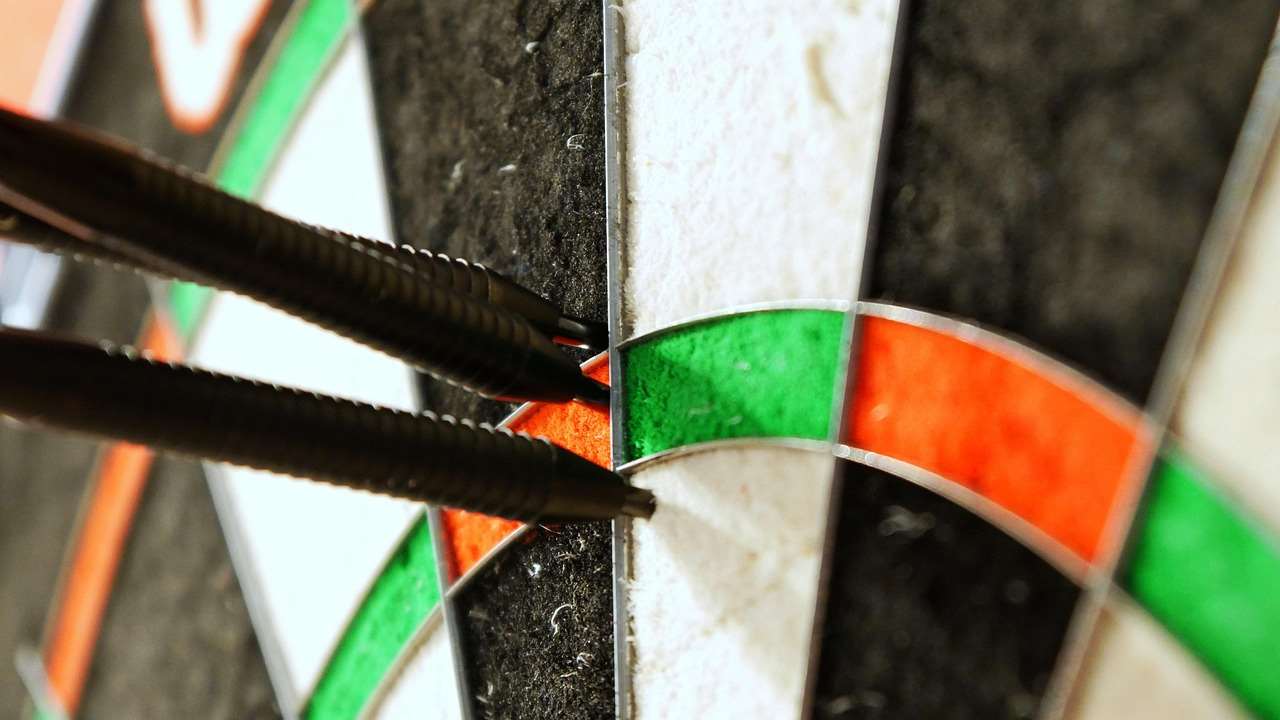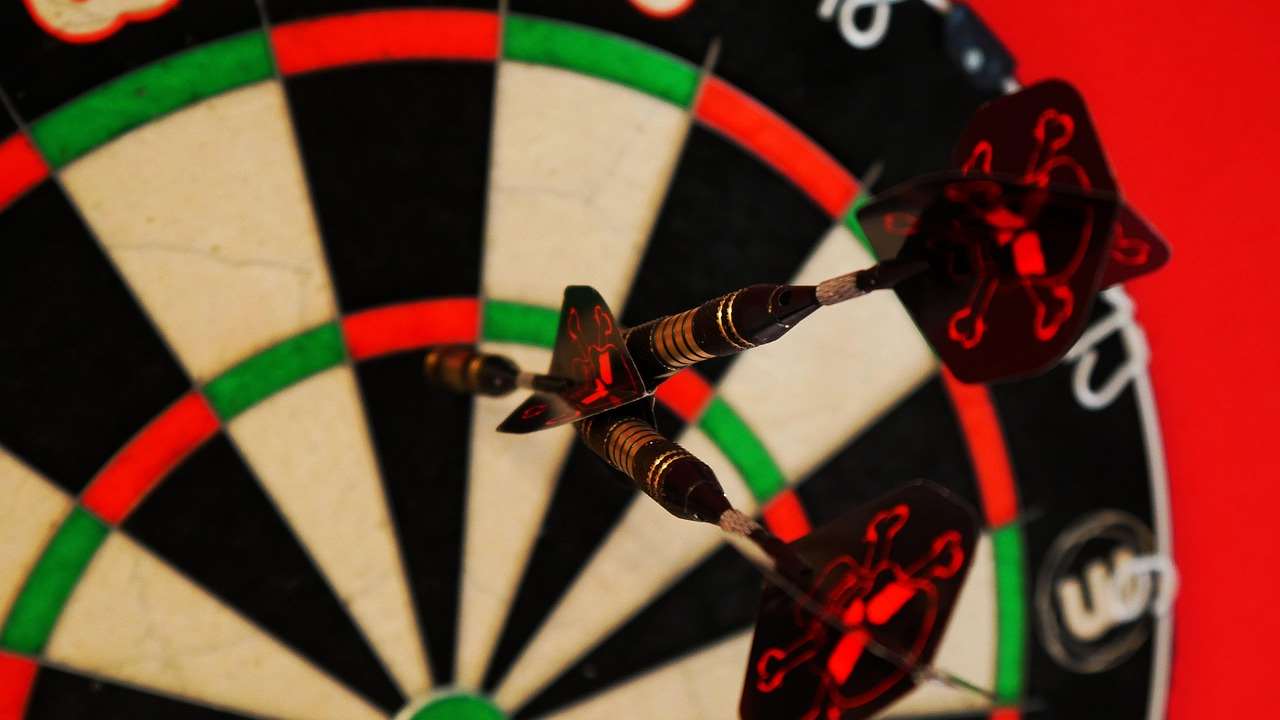If you grip your darts at the back, selecting the best target darts for rear grippers is crucial for achieving consistent accuracy and comfortable throws; look for darts with enhanced grip zones near the barrel’s rear. This article will explore the specific features and dart types that cater perfectly to rear grippers, ensuring you find the ideal setup to elevate your dart game, as well as delving into the importance of weight, balance, and material.
⚠️ Still Using Pen & Paper (or a Chalkboard)?! ⚠️
Step into the future! The Dart Counter App handles all the scoring, suggests checkouts, and tracks your stats automatically. It's easier than you think!
Try the Smart Dart Counter App FREE!Ready for an upgrade? Click above!
Understanding the Rear Grip and its Impact on Dart Selection
A rear grip involves holding the dart closer to the flights, which can influence the dart’s trajectory and stability during flight. This style often requires a dart that promotes balance and control from the back end. When choosing darts, rear grippers need to consider specific features tailored to their grip style. Factors like barrel length, weight distribution, and the type of grip texture are paramount in selecting the right dart.

The Importance of Barrel Design for Rear Grippers
The barrel design significantly affects how a rear gripper interacts with the dart. A longer barrel can offer more gripping surface, providing better control and stability. However, it’s not just about length; the shape and contours of the barrel also play a critical role.
- Straight Barrels: Offer a consistent grip along the entire length.
- Torpedo Barrels: Wider at the front and tapering towards the back; might not be ideal for all rear grippers, but some find the balance beneficial.
- Scalloped Barrels: Feature a defined groove, creating a natural and consistent grip point – potentially helpful for rear grippers seeking a tactile reference.
Experimenting with different barrel shapes is essential to find what feels most comfortable and provides the best release.
Key Features to Look For in the Best Target Darts for Rear Grippers
Finding the best target darts for rear grippers involves paying close attention to several key features. These features can dramatically impact your throwing accuracy and overall comfort. Consider these elements:
- Grip Texture: Aggressive knurling, micro-cuts, or rings at the rear of the barrel.
- Balance Point: Darts with a balance point closer to the rear may naturally suit a rear grip.
- Dart Weight: Experiment with different weights to find what offers the best control.
- Material: Tungsten darts are denser, allowing for a slimmer barrel, which can improve grouping. Consider also the dart shaft materials to further refine your set-up.
The Significance of Grip Texture for Rear Grippers
The grip texture on your darts is paramount for maintaining control and consistency. Rear grippers, in particular, often benefit from a more aggressive grip at the back of the barrel. Here are a few options:
- Knurled Grip: Offers a rough, tactile feel, providing excellent grip security.
- Ringed Grip: Provides a series of raised rings, offering a consistent and predictable grip point.
- Micro-Grip: Features very fine cuts or textures, offering a subtle yet effective grip enhancement.
The right grip texture will depend on personal preference and the amount of grip you require. Try different textures to see what works best for you. Look for darts specifically designed for enhanced rear grip.

Understanding Dart Weight and Balance for Rear Grippers
Dart weight plays a crucial role in how the dart flies and feels in your hand. Rear grippers may find that slightly heavier darts offer more stability and control, but ultimately, the ideal weight is a matter of personal preference. Typically dart weights range from 21-26 grams.
Experimenting with Different Dart Weights
It is advisable to test different weights.
Start with a medium weight (e.g., 23 grams) and adjust up or down based on your experience. A dart that is too light might feel unstable, while a dart that is too heavy could strain your arm.
Achieving Optimal Balance for Rear Grippers
Dart balance is also critical. For rear grippers, a dart with a slightly rearward balance might feel more natural and easier to control. This can be achieved through the barrel design or by using shorter shafts. Consider using the Electronic dart score counter to keep track of your results with different dart setups!

Material Matters: Tungsten vs. Brass Darts for Rear Grippers
The material of the dart barrel influences its density and therefore its diameter for a given weight. Tungsten darts are denser than brass, meaning that a tungsten dart can be slimmer than a brass dart of the same weight. This can be advantageous for grouping your darts closer together on the dartboard.
Benefits of Tungsten Darts for Rear Grippers
- Slimmer Profile: Allows for tighter groupings and reduces deflections.
- Durability: Tungsten is more durable than brass, so your darts will last longer.
- Consistent Weight: Tungsten darts are manufactured to tighter tolerances, ensuring more consistent weight and balance.
Brass Darts: An Affordable Option for Beginners
Brass darts are a more affordable option, making them a good choice for beginners or casual players. However, they are generally bulkier than tungsten darts and may not offer the same level of performance. If you’re serious about improving your game, investing in tungsten darts is generally recommended.

Fine-Tuning Your Setup: Shafts and Flights for Rear Grippers
While the barrel is the most crucial component, the shafts and flights also contribute to the overall performance of your darts. Rear grippers may find that shorter shafts and smaller flights offer better control and stability.
Selecting the Right Shaft Length
Shorter shafts can help to bring the balance point of the dart further back, which can be beneficial for rear grippers. Experiment with different shaft lengths to see what feels most comfortable and provides the best results. Remember to also buy the correct darts surround set to protect the wall around your dartboard!
Choosing the Right Flight Shape and Size
Smaller flights generally offer more stability and control, while larger flights provide more lift and drag. For rear grippers, smaller flights are often a good choice, as they can help to prevent the dart from wobbling in flight. Standard flights are the most common option, but other shapes like slim or kite flights may also be worth considering.

Maintenance and Care for Your Target Darts
Proper maintenance and care will help to extend the life of your darts and ensure consistent performance. Clean your dart barrels regularly with a soft cloth to remove dirt and oil. Check your shafts and flights for damage and replace them as needed. Consider using a dart sharpener to keep the points sharp, which will improve their ability to stick in the dartboard. Don’t forget to brush up on darts best finish techniques to maximize your scoring!
Finding the Best Target Darts for Rear Grippers: Experimentation is Key
Ultimately, finding the best target darts for rear grippers is a personal journey. Experiment with different barrel shapes, grip textures, weights, and shaft/flight combinations to discover what works best for your unique throwing style. Don’t be afraid to try new things and adjust your setup as you improve. Pay attention to what feels comfortable and consistent, and track your progress over time. And while you’re at it, why not challenge your friends to a darts club game?
Conclusion
Choosing the right darts for a rear grip involves considering the barrel’s grip, weight distribution, and overall balance. Experimentation is key to discovering the best target darts for rear grippers that perfectly complement your throwing style. By carefully considering these factors, you can enhance your accuracy, improve your consistency, and elevate your dart game to the next level. So, take the time to explore different options, refine your setup, and enjoy the journey of finding your perfect dart! Start experimenting today and unlock your full dart-playing potential!
Hi, I’m Dieter, and I created Dartcounter (Dartcounterapp.com). My motivation wasn’t being a darts expert – quite the opposite! When I first started playing, I loved the game but found keeping accurate scores and tracking stats difficult and distracting.
I figured I couldn’t be the only one struggling with this. So, I decided to build a solution: an easy-to-use application that everyone, no matter their experience level, could use to manage scoring effortlessly.
My goal for Dartcounter was simple: let the app handle the numbers – the scoring, the averages, the stats, even checkout suggestions – so players could focus purely on their throw and enjoying the game. It began as a way to solve my own beginner’s problem, and I’m thrilled it has grown into a helpful tool for the wider darts community.